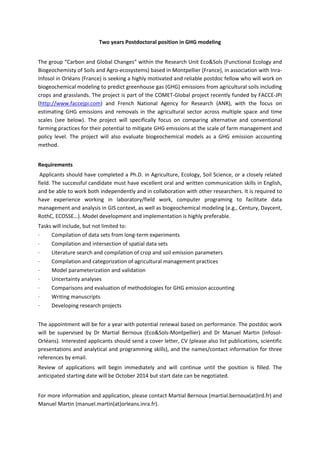
Post doc position france
- 1. Two years Postdoctoral position in GHG modeling The group “Carbon and Global Changes” within the Research Unit Eco&Sols (Functional Ecology and Biogeochemisty of Soils and Agro‐ecosystems) based in Montpellier (France), in association with Inra‐ Infosol in Orléans (France) is seeking a highly motivated and reliable postdoc fellow who will work on biogeochemical modeling to predict greenhouse gas (GHG) emissions from agricultural soils including crops and grasslands. The project is part of the COMET‐Global project recently funded by FACCE‐JPI (http://www.faccejpi.com) and French National Agency for Research (ANR), with the focus on estimating GHG emissions and removals in the agricultural sector across multiple space and time scales (see below). The project will specifically focus on comparing alternative and conventional farming practices for their potential to mitigate GHG emissions at the scale of farm management and policy level. The project will also evaluate biogeochemical models as a GHG emission accounting method. Requirements Applicants should have completed a Ph.D. in Agriculture, Ecology, Soil Science, or a closely related field. The successful candidate must have excellent oral and written communication skills in English, and be able to work both independently and in collaboration with other researchers. It is required to have experience working in laboratory/field work, computer programing to facilitate data management and analysis in GIS context, as well as biogeochemical modeling (e.g., Century, Daycent, RothC, ECOSSE…). Model development and implementation is highly preferable. Tasks will include, but not limited to: ∙ Compilation of data sets from long‐term experiments ∙ Compilation and intersection of spatial data sets ∙ Literature search and compilation of crop and soil emission parameters ∙ Compilation and categorization of agricultural management practices ∙ Model parameterization and validation ∙ Uncertainty analyses ∙ Comparisons and evaluation of methodologies for GHG emission accounting ∙ Writing manuscripts ∙ Developing research projects The appointment will be for a year with potential renewal based on performance. The postdoc work will be supervised by Dr Martial Bernoux (Eco&Sols‐Montpellier) and Dr Manuel Martin (Infosol‐ Orléans). Interested applicants should send a cover letter, CV (please also list publications, scientific presentations and analytical and programming skills), and the names/contact information for three references by email. Review of applications will begin immediately and will continue until the position is filled. The anticipated starting date will be October 2014 but start date can be negotiated. For more information and application, please contact Martial Bernoux (martial.bernoux(at)ird.fr) and Manuel Martin (manuel.martin(at)orleans.inra.fr).
- 2. COMET‐Global: Whole‐farm GHG estimation and environmental diagnostics platform (2014‐2016) PI: Keith Paustian, Colorado State University and CoPI: Stephen Ogle, Colorado State University Project Partners: Jorge Alvaro‐Fuentes – Spanish National Research Council, Spain; Martial Bernoux – IRD, France ; Peter Grace – Queensland University of Technology, Australia ; Emanuele Lugato – EU‐ JRC, Italy ; Manuel Martin – INRA, France ; Johan Six – Federal Institute of Technology, Switzerland ; Jo Smith – University of Aberdeen, UK ; Pete Smith – University of Aberdeen, UK Project summary Access to reliable and readily available estimates of the consequence of different land use and management practices on greenhouse gas (GHG) emissions is a prerequisite for successful implementation of land use‐based GHG mitigation strategies. Moreover, this information is needed at the level at which management decisions are actually made – at the field scale – and thus information systems must be: 1) easily and universally available, 2) usable by non‐experts, 3) employ state‐of‐the‐art technology and 4) be easily aggregated to larger scales. Our overall project aim is to develop and deploy a state‐of‐the‐art system for full greenhouse gas (GHG) accounting, operational at the scale of an individual entity (e.g., farm, livestock operation). The system will be web‐based, free and accessible by anyone having an internet connection. Key attributes of the system will include: 1) use of advance methods, including well‐validated process‐ based models that are run in real‐time at high spatial resolution, using site‐specific data on soil properties, climate and land use and management practices; 2) flexibility, so that users can select, were appropriate, country‐specific methods and emission parameters; 3) user‐friendly design, making it possible for land managers and others, without specialized knowledge of GHG emission processes to use the system, in their native language; and 4) information on uncertainty, based on robust statistical methods. An important goal of the consortium will be to disseminate and promote the uptake of the COMET‐Global system, including engagement and outreach to farmer organizations, environmental groups, governmental agencies and other stakeholders in each of the partner countries, as well as other researchers working on GHG mitigation in the land use sector. The system development will leverage an existing comprehensive web‐based tool, COMET‐Farm, operational in the US. In addition to implementing spatial data (climate, soil, land management) and country‐specific emission factors and methods for non‐soil GHG emissions, two widely used process‐ based models, RothC and ECOSSE, will be incorporated along with the DayCent model for estimating soil GHG emissions. The user interface will be provided with multi‐lingual capabilities (English, French, Spanish, German and Italian) to provide maximum convenience on the part of a multinational user community.